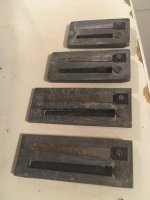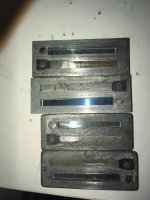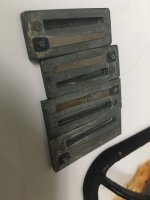Late to the party... Excuse me for poking my nose in: I know little about accordions, but I DO know a bit about engineering...
Rust removal by chemical means (acids and/or chelating agents), in this application, risks the possibility of setting off dissimilar metal (galvanic) corrosion, where electrolyte remains trapped between reed and reed plate. Also, depending on the material used for the reed plate, the acid may attack it more than it removes rust. Therefore, I think chemical removal is best avoided. As has been said, WD40 has no effect on rust, other than providing a medium to 'wash' it off. Also, any residual film of WD40 will tend to oxidise to a sticky gum, which will hold dust, etc. Again, best to avoid water-displacement or corrosion-protection fluids. Certainly don't rub pencil/graphite onto reeds, as I've seen advocated. This will set up an electro-chemical cell, if there's moisture present, and thus corrosion. It's for this reason that marking aircraft components with pencil is prohibited, and residual graphite, used as a drawing lubricant in the manufacture of copper pipes, is the cause of pin-hole pipe perforations, which keep plumbers wealthy!
Faber-Castell and others produce propelling-pencil-like things that hold tight bundles of glass fibres. Originally produced as drafting film erasers (to remove indian ink), they are now used a lot in fine manufacturing as abrasive brushes. Gentle, but very effective against light rust. It's also possible to get brass and stainless steel refills for them. Essential toolkit items! There are also similar, but smaller diameter items, often with 'ceramic' fibres. Good for very fine work, but very expensive.
'Naphtha' is rather a dustbin term for light petroleum distillates. 'White spirit' or 'Mineral turps' could also be called 'naphtha'. Xylene is a good/better wax solvent. It may be difficult to get, but some paintbrush cleaners/restorers contain it. Just be careful when buying such stuff - it's often difficult to tell from the packaging just what's inside...









